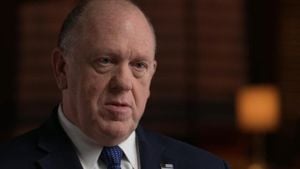The conflict between Russia and Ukraine has escalated dramatically as casualty figures rise to unprecedented levels, with Russia suffering significant losses. Over the past few days, reports indicate Russian military fatalities have reached staggering numbers—nearly 1,950 soldiers killed on November 11 alone, following 1,770 the previous day. This surge has pushed the total Russian military deaths since the onset of the conflict on February 24, 2022, to approximately 712,610, according to the Ukrainian General Staff. Such alarming statistics mark some of the highest losses Russia has faced since the beginning of the invasion.
Independent verification of these casualty figures is tricky due to the lack of cooperation between the two nations. Both governments tend to withhold accurate military statistics, making it difficult to ascribe blame or confirm the numbers. Nonetheless, Ukrainian officials, using the platform formerly known as Twitter, emphasized the rapid decline of Russian troops, noting, “Every 49 seconds, Russia lost one soldier. We make the occupiers pay the highest price for their brutal invasion.”
Such escalations have been accompanied by fierce fighting, with Ukrainian forces recently repelling significant Russian offensive actions. Pictures and videos circulated among military social media outlets show Ukrainian defenders engaged directly with Russian troops, leading to the destruction of enemy equipment and personnel.
Meanwhile, the economic repercussions of the conflict are beginning to show signs of strain on Russian businesses. Sources from Bloomberg have reported several Russian billionaires expressing doubts about the optimistic economic forecasts circulated by the Kremlin. Many predict pessimism surrounding the country's recovery will only deepen as external sanctions and the costs of the war become increasingly evident. Reports suggest the Central Bank of Russia has implemented drastic measures, raising interest rates to historic highs of up to 21% to suppress inflation, which some entrepreneurs have critiqued as overly conservative.
The atmosphere surrounding the conflict is not just limited to military and economic strains but extends to geopolitical ramifications. The invocation of NATO by both sides continues to be a contentious issue and appears pivotal to the discussion underlying the Russian invasion. Some analysts believe the notion of Ukraine potentially joining NATO was seen by Moscow as directly threatening to its historical sphere of influence. Proponents of this view argue NATO expansion has been provocative historically and should be considered when assessing the causes behind the invasion.
Nonetheless, Jon Richardson recently argued against attributing the invasion solely to NATO actions, emphasizing instead Russia's imperialistic tendencies as the driving force for aggression. Yet, as he points out, the situation is multifaceted. The invasion's timing and the legacy of Russian imperialism don't seem to align if one considers other variables, particularly how Ukraine aligned itself with western ambitions following the 2014 Maidan uprising.
Recent increases in U.S. support for Ukraine following the recent elections have left room for analytical debate on its future foreign policy approach. While President-elect Trump has signaled intentions to re-evaluate America's role, his history suggests he might prioritize inward-focused policies. Some speculate Trump may even retract military support to Ukraine, creating more uncertainty for the nation trying to fend off Russian advances.
This report coincides with unofficial channels indicating Ukraine is preparing for more tumultuous battles. With economic factors threatening military efforts and leading to possible shifts on the battlefield, the Ukrainian government may soon face pressures to negotiate. Such discussions could shift public sentiment and political dynamics within Ukraine itself, especially if doubts arise over the long-term prospects of resisting Russian advances without continued Western support.
On the religious front, the Ukrainian Greek Catholic Church, led by Major Archbishop Sviatoslav Shevchuk, continues to play a prominent role amid war's backdrop. Shevchuk reflected on the church's situation punishing civilians and providing refuge to those fleeing violence, underscoring the church’s importance as not just a humanitarian organization but also as one of hope. He emphasized the need to maintain faith and connection with the community, stating, “The church can offer the soul something more, which enhances all other forms of care received.”
Major Archbishop Shevchuk has criticized current attempts to weaponize faith within the conflict, invoking deep concern about the potential demise of religious properties and how faith and prayer can represent solace amid devastation. By highlighting communal burdens, he signals the necessity for utilizing historical experiences of survival to galvanize resilience among the wider population.
During discussions with global leaders, the Vatican has taken on significant interest concerning the war. Shevchuk acknowledged Pope Francis’s choice to remain neutral diplomatically, which allows him to maintain channels of communication for those suffering materially and spiritually. This neutrality does not reflect indifference, as the church's moral stance is overtly pro-Ukrainian. The Vatican’s position continually sends waves of reassurance through the Catholic communities supporting Ukraine’s plight.
Despite the bleak circumstances, the Archbishop emphasized the need for Ukrainians to cultivate resilience against despair, urging love for their homeland over the hatred born from violence. He underscored, “We must overcome mutual dehumanization, just as Europe did after World War II,” conveying hope for recovery and reconciliation post-conflict.
Even within Russia, significant cracks are beginning to appear within the structures of the regime. Some tycoons have been quite candid about their lack of trust in the future economic outlook. Their belief seems rooted both in the Kremlin's suppression of inflationary pressures through unsustainable tactics and failure to adequately adapt to the realities of international economic sanctions and their implications. Throughout this volatility, the potential for civil discontent and public disappointment with the government's direction looms ever closer.
All parties remain on edge as the conflict does not seem close to resolution. The specter of negotiation hangs heavily over the battlefield, as the plights of civilian casualties and economic ruin exacerbate the humanitarian crisis facing both nations. With external powers, like NATO, still hovering over the situation like shadows, the true path forward remains ambiguous.



